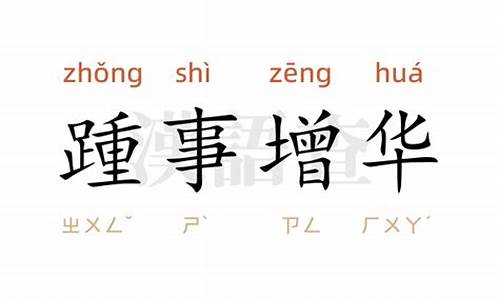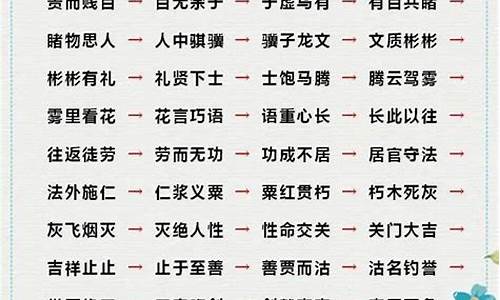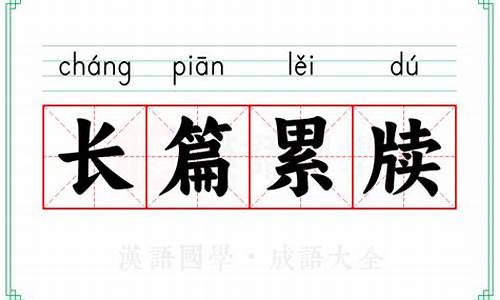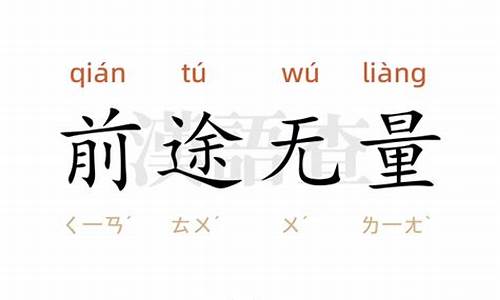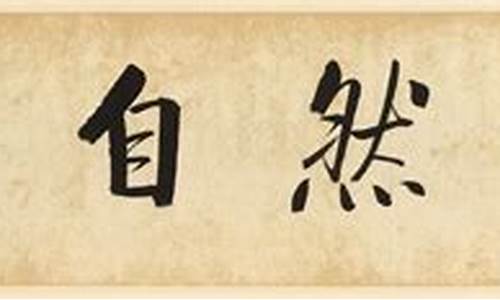挥金如土英语翻译-挥土如金的英文
1.英语四级必备:这些高频词组要知道!
2.英语翻译成成语
3.浅谈汉语歇后语的翻译方法
4.“乱花钱”,用英语怎么说?
英语四级必备:这些高频词组要知道!

1.利远大于弊:The advantages far outweigh the disadvantages.
2.理论和实践相结合:integrate theory with practice
3. 劳动力市场:labor market
4.扩大知识面:expand one's scope of knowledge
5.可以替代 think 的词:
believe, claim, maintain, argue, insist, hold the opinion / belief / view that
6.可靠的信息源:a reliable source of information
7.可降解的/可分解的材料:degradable / decomposable material
8.考虑到诸多因素:take many factors into consideration
9.开阔眼界:widen one's horizon / broaden one's vision
10.据报道:It is reported that...
11.就我而言/ 就个人而言:As far as I am concerned/ Personally
12.竞争与合作精神:sense of competition and cooperation
13.经济改革:economic reform
14.经济/心理负担:financial burden / psychological burden
15.解释,占...比例:account for
16.解决环境及社会不平衡的问题:
find solutions to environment and the imbalance of society
17.交流思想/ 情感/ 信息:exchange ideas / emotions / information
18.计划经济:planned economy
19.挥金如土:spend money like water
20.缓解压力/ 减轻负担:relieve stress / burden
21.环保的材料:environmentally friendly materials
22.归因于:be attribute to
23.更多地强调:put more emphasis on?
24.跟上?的最新发展:
keep pace with / keep abreast with the latest development of?
25.复杂的社会现象:a complicated social phenomenon
26.方便快捷:convenient and efficient
27.反映了社会进步的:mirror the social progress/advance
28.发挥日益重要作用:play an increasingly important role in?
29.而不是:rather than
30.对这一问题持有不同态度:hold different attitudes towards this issue
31. 对?有益:be beneficial to / be conducive to?
32.对?有害:do harm to / be harmful to / be detrimental to
33.对?产生有利/不利的影响:exert positive / negative effects on?
34.对?必不可少:be indispensable to ?
35.导致很多问题:give rise to / lead to / spell various problems
36.导致,引起:lead to / give rise to / contribute to / result in
37.代替:replace / substitute / take the place of
38.大大方便了人们的生活:sth has greatly facilitated people's lives.
39.打下坚实的基础:lay a solid foundation for?
40.从另一个角度:from another perspective
41.充分利用:make full use of / take advantage of
42.承受更大的工作压力:suffer from heavier work pressure
43.不可推卸的义务:unshakable duty
44.不可否认:It is undeniable that?
45.保障社会稳定和繁荣:guarantee the stability and prosperity of our society
46.宝贵的自然资源:valuable natural resources
47.把时间和精力放在?上:focus one's time and energy on?
48.有其自身的优缺点:has its own merits and demerits / pros and cons
49.主要理由列举如下:The main / leading reasons are listed as follows:
50.必然趋势:an irresistible trend of?
更多大学英语四级考试资讯、备考方法、每日习题等,小编都会及时进行更新,请大家持续关注起来,祝愿各位考生顺利通过考试。
英语翻译成成语
poor
as
a
church
mouse
一贫如洗
at
sixes
ahd
sevens
乱七八糟
挥金如土
like
a
duck
to
water
轻而易举
浅谈汉语歇后语的翻译方法
歇后语名称的翻译
目前,对“歇后语”一词的翻译难以统一。有人翻译为Chinese enigmatic folk similes,这一译法的缺点是歇后语中不全是比喻,也有谐音或双关式歇后语。有人翻译为quiz-cracks(隐语或谜语),同样也不全面。于是有人提议直接翻译为xiehouyu in Chinese,这倒是有一定的可借鉴性。因为歇后语是中华民族的独特文化,正如二胡(erhu)、中国功夫(Chinese gongfu)等。但是,追根溯源,歇后语最早是文人之间的一种文字游戏,最早叫做“俏皮话”,因此,有人据此大胆翻译为Chinese folk wisecracks。
比喻性歇后语的翻译方法
直译法: 对大多数喻义歇后语,由于比喻部分生动形象,喻义部分逻辑推理合乎情理,不包含一词两义的双关或谐音,通常采用直译法,既传达源语的内容,又维持源语的形象,便于读者阅读和欣赏。例如:
瞎子点灯--白费蜡。 It is as useless as a blind man lighting a candle.
黄鼠狼给鸡拜年--不怀好意。 A weasel wishing Happy New Year to a chicken-harboring no good intention.
肉包子打狗--有去无回。 Chasing a dog by throwing meat dumplings at it-gone, never to return.
竹篮打水--一场空。 Like ladling water with a wicker basket-all is empty (nothing).
八仙过海--各显其能。 (Like) the Eight Immortals crossing the sea-each showing his or her special prowess. ( Each of them shows their true worth.)
隔着门缝看人--把人瞧扁了。 If you peer at a person through a crack-he looks flat.
兔子尾巴长不了。 The tail of a rabbit-cannot be long; won't last long.
谐音或双关式歇后语的翻译方法
解释法:解释法是一种行之有效的翻译方法,也是揭示源语文化内涵的重要途径,它是指在译文里保留原来的文化色彩,并加上简要的解释说明以突出其形象性。解释法可以细分为解释性替代和解释性增补两种类型。
解释性替代
解释性替代是指当词语在源语和译语中的内涵意义相同,但联想意义不同时,不能按照字面翻译,而应该用解释性替代的方法翻译原文。汉语中的成语即谚语翻译一般用解释性替代的方法来进行翻译,例如: 挥金如土 spend money like water
解释性增补
解释性增补是指当源语中词语的内涵意义在译语中出现词汇空缺,其联想意义也出现空白时,译者必须保留源语的词语形象,而将其深层含义以解释的形式翻译出来,揭示出源语的文化特性或文化背景。汉语中特有的歇后语在译成英语时,可以保留原语形象,再用解释性增补以表现其喻意。
利用汉语的谐音
牛角抹油——又尖(奸)又滑(猾) Spreading oil on an ox horn——to make it sharper and more slippery or cunning and treacherous.
李双双见到丈夫——有喜旺(希望)
Li Shuangshuang sees her husband——she has Xiwang now; like Li Shuangshuang meeting her husband Xiwang, a homophone for the Chinese word xiwang meaning hope, there is hope now.
利用双关语义
井底雕花——深刻 Carving a flower design on the bottom of a well——carving deeply or get to the essence of something.
擀面杖吹火———一窍不通 A rolling pin used as a bellows —no good at all.
王小二过年——一年不如一年
Wang Xiao'er spending the New Year——one year is worse than another; like Wang Xiao’er's life, one year is worse than another.
飞机上跳伞——一落千丈
Bale out from a flying plane——drop down a thousand zhang or suffer a drastic decline; like jumping from a flying plane, they decline drastically.
利用典故
英汉两种语言中存有大量由历史典故形成的习语,如,“东施效颦”、“名落孙山”、“叶公好龙”等等。英语典故习语多来自《圣经》和希腊罗马神话,如Achilles'heel(唯一致命弱点)、meet one's Waterloo(一败涂地)、Penelope's web(永远完不成的工作)、a Pandora's box(潘多拉之盒,代表灾难、麻烦、祸害的根源)等。
有关典故的这些习语结构简单,意义深远,往往是不能单从字面意义去理解和翻译的。在翻译利用典故的歇后语时,如果仅仅使用解释性增补方法是远远不够的,我们还应该对译文加以注释,从而从文化上和历史上更准确地传达汉语歇后语所包含的民族和文化特色。
八仙聚会——又说又笑
A gathering of Eight Immortals——speaking and laughing; like the Eight Immortals at a gathering, they are talking and laughing merrily.
Note: The Eight Immortals refer to the eight Taoists in a Chinese legend, namely, Han Zhongli, Zhang Guolao, Lü Dongbin, Tieguai Li, Han Xiangzi, Cao Guojiu, Lan Caihe and He Xiangu.
王羲之写字——横竖都好
A character out of Wang Xizhi’s hand——vertical strokes are as good as horizontal ones; like Wang Xizhi's calligraphy, it is good in every way.
Note: Wang Xizhi was a famous Chinese calligrapher and a Chinese character is usually composed of strokes, of which the vertical and horizontal ones are the most commonly used. Hengshu here has two interpretations: 1) the horizontal and vertical strokes; 2) horizontally or vertically, that is, in any way.
灶王爷扔石头——砸锅
The Kitchen God throwing stones——to break the pot or ruin the matter.
Note: The literal meaning of zaguo is to break a pot but it is usually used to mean ruining the matter.
秦叔宝卖马——穷途末路
Qin Shubao selling his horse——the last resort to overcome his difficulty; like Qin Shubao selling his horse, they are driven into a dead end
Note: Qin Qiong, styled Shubao, was a famous general in the Tang Dynasty. Before becoming a general, he was once penniless and had no way out but to sell his own horse.
“乱花钱”,用英语怎么说?
作为一个学生党,家里每个月给1500的生活费,但是对于我这样一个爱买东西的人来说远远不够,所以经常利用自己的闲暇时间去兼职,虽然我消费水平高,但是不意味着挥金如土。
怎么定义乱花钱呢?
第一就是你买的东西可有可无,买后几乎不会用到。第二呢对于个人来说就是买一些太过奢侈的东西。
那么乱花钱用英语怎么说呢?
用英语语法翻译出来就是:Spending ?your money on unuseful things.或是用中国的成语来说就是挥金如土:make the money fly。使钱飞起来,用中国人的翻译习惯来说就是挥金如土。挥金如土的意思是用钱像挥霍泥土一般,形容对金钱极端的浪费。所以有网友吐槽说今天的挥汗如雨就是为了明天的挥金如土。
乱花钱正式的表达是用:dip into one's purse。dip 是浸,蘸,下沉的意思。purse是钱包,钱袋,手提包的意思。这样理解就是浸泡在钱包里面,也就是乱花钱的意思。
每个人追求的不一样,有的人一辈子只为了开一辆拿的出手的车,为了一个温暖的家,有的人却是为了一辈子能过得潇潇洒洒的,吃喝玩乐,只要是能用钱买来开心和和快乐,钱又如土,更悲惨的是有的人只为了吃饱穿暖。所以不同的人对待金钱的态度不一样,只是因为他们的消费观念还有工资水平不一样。
声明:本站所有文章资源内容,如无特殊说明或标注,均为采集网络资源。如若本站内容侵犯了原著者的合法权益,可联系本站删除。

